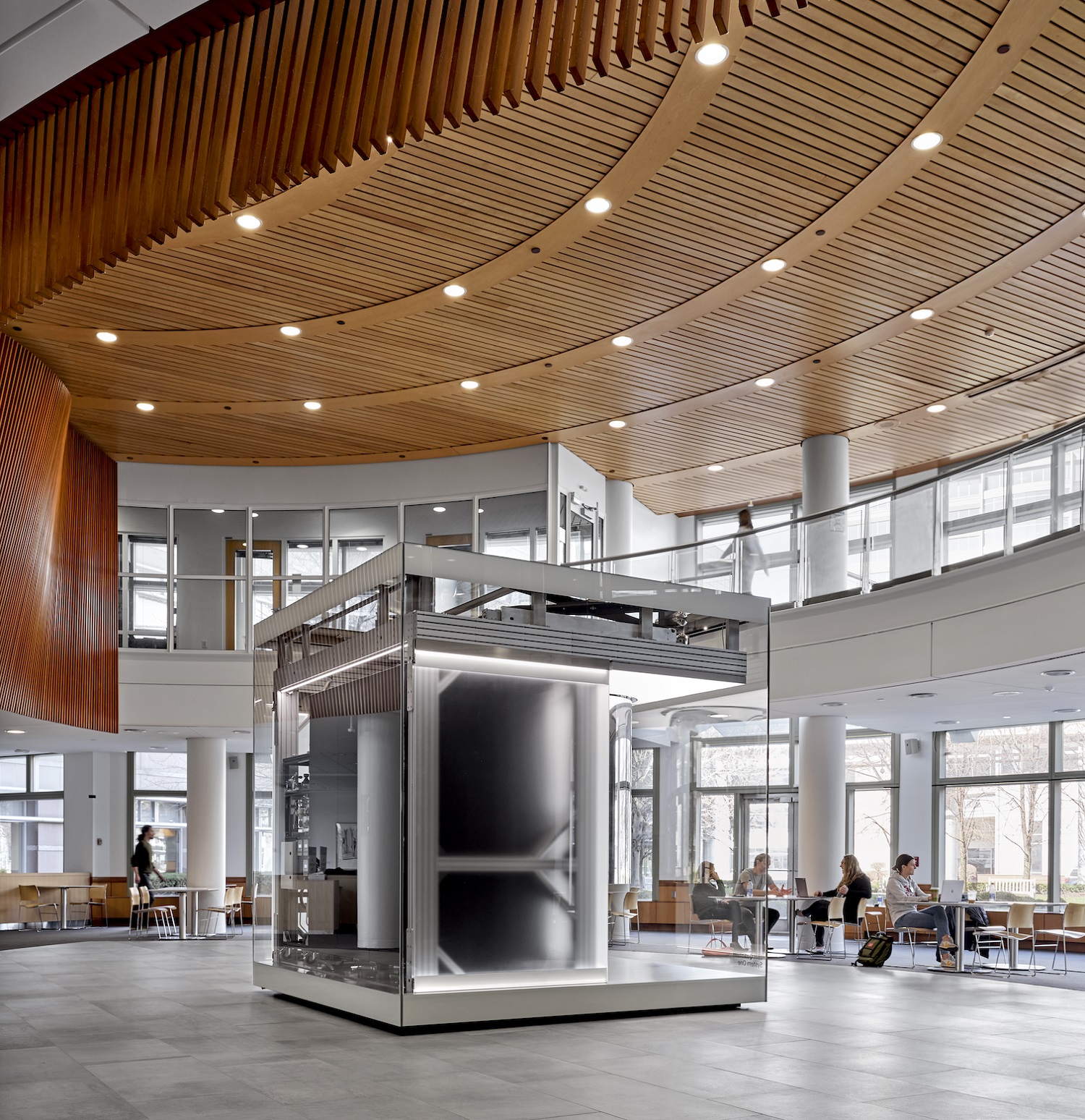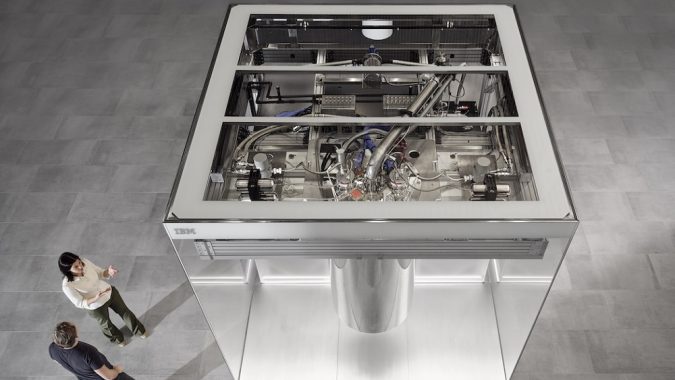IBM today launched the first installation of an IBM Quantum System One at a collaborator site in the U.S. – this one is at the Cleveland Clinic where IBM’s 127-qubit Eagle QPU will be used for medical research. D-Wave, also today, debuted a hybrid plug-in solver for its SDK, and (in case you missed it) AWS just made available the Quantum Instrumentation Control Kit (QICK), jointly developed with the Department of Energy, Princeton University, and the University of Chicago.
These are interesting times in quantum information science. The race for quantum advantage writ large is speeding up and morphing into something beginning to be called quantum benefit – the idea that quantum can provide a meaningful contribution to research and commerce but in concert with classical systems rather than, strictly-speaking, by outperforming classical counterparts.
Let’s start with IBM and the Cleveland Clinic.
IBM/Cleveland Clinic Unveil Quantum Computer Dedicated to Healthcare
Announced in 2021 as part of 10-year collaboration, the joint work is being described as a Discovery Accelerator partnership “focused on advancing the pace of biomedical research through the use of high-performance computing, artificial intelligence and quantum computing.”
While we tend to think of quantum computers as exotic creatures housed in exotic environments – mostly frigid dilution refrigerators at near zero Kelvin temperatures – the IBM Quantum System One is a sleek-looking system housed in an open gathering area inside Cleveland Clinic (shown below). It has all the necessary equipment inside and will not require excessive servicing, although IBM will have a handful of onsite staff, mostly biomedical researchers.

Ruyoi Zhou, director, IBM Cleveland Clinic Research, told HPCwire, “The collaboration is not just on quantum. We want to integrate classic computing, artificial intelligence and quantum computing. If a problem can be resolved by saying HPC or artificial intelligence can get to 90% of accuracy, you may not need a quantum computing. The two teams are working together to identify medical challenges – I call them the driving forces – to look for opportunities that we can solve with HPC or with AI and other methods or that fit a quantum computer.”
Early projects have been picked but Zhou did not discuss them in detail. As described broadly in the official announcement they include:
- Development of quantum computing pipelines to screen and optimize drugs targeted to specific proteins
- Improvement of a quantum-enhanced prediction model for cardiovascular risk following non-cardiac surgery
- Application of artificial intelligence to search genome sequencing findings and large drug-target databases to find effective, existing drugs that could help patients with Alzheimer’s and other diseases.
In addition to maintaining the new system, a major goal is to build up IBM healthcare/life sciences domain knowledge, said Zhou.
Here’s more from the official announcement: “The Discovery Accelerator also serves as the technology foundation for Cleveland Clinic’s Global Center for Pathogen & Human Health Research, part of the Cleveland Innovation District. The center, supported by a $500 million investment from the State of Ohio, Jobs Ohio and Cleveland Clinic, brings together a team focused on studying, preparing and protecting against emerging pathogens and virus-related diseases. Through the Discovery Accelerator, researchers are leveraging advanced computational technology to expedite critical research into treatments and vaccines.
“A significant part of the collaboration is a focus on educating the workforce of the future and creating jobs to grow the economy. An innovative educational curriculum is being designed for participants from high school to the professional level, offering training and certification programs in data science, machine learning and quantum computing to build the skilled workforce needed for cutting-edge computational research of the future.”
It will be interesting to monitor progress. The current collaboration is for research not clinical purposes; the latter requires various FDA certifications. One earlier measure of success will be the generation of scientific papers, agreed Zhou. The hope is that many of the learnings will eventually make their way into healthcare.
IBM, of course, has an ambitious roadmap. It introduced a 433-qubit device (Osprey) late last year and is expected to provide access to it in 2023 although it has not done so yet. Later this year IBM plans to introduce an 1121-qubit device (Condor). Zhou said the IBM Quantum System One at Cleveland Clinic can undergo some improvement but would not get future QPUs. She did say there are tentative plans for putting a Quantum System Two (complete new enclosure/system now under development) at the Cleveland Clinic.
Hopes are high for quantum’s impact on healthcare.
Tom Mihaljevic, Cleveland Clinic CEO, noted, “This is a pivotal milestone in our innovative partnership with IBM, as we explore new ways to apply the power of quantum computing to healthcare. This technology holds tremendous promise in revolutionizing healthcare and expediting progress toward new cares, cures and solutions for our patients. Quantum and other advanced computing technologies will help researchers tackle historic scientific bottlenecks and potentially find new treatments for patients with diseases like cancer, Alzheimer’s and diabetes.”
D-Wave Adds Plug-in for Hybrid Solver
Like others, D-Wave has been aggressively building its hybrid solver capabilities that allow users to blend quantum and classical computation. Today, D-Wave released a new plug-in for its hybrid solver that integrates quantum functionality into feature selection machine learning workflows.
As described by D-Wave, “feature selection – a key building block of machine learning – is the problem of determining a small set of the most representative characteristics to improve model training and performance in ML. With the new plug-in, ML developers need not be experts in optimization or hybrid solving to get the business and technical benefits of both. Developers creating feature selection applications can build a pipeline with scikit-learn (industry-standard ML library for Python) and then embed D-Wave’s hybrid solvers into this workflow more easily and efficiently.”
Murray Thom, vice president of quantum business innovation at D-Wave, said, “We’re hearing from customers that the combination of quantum hybrid solutions with feature selection in AI/ML model training is important for accelerating business impact,” said “This plug-in represents yet another example of how D-Wave is facilitating quantum ML workstreams and making it easy to incorporate optimization in feature selection efforts.”
The new plug-in and other D-Wave tools are available on the company’s Leap quantum cloud service as well as on AWS Marketplace.
QICK – New Tool Expands Access to Lab-based Quantum Prototypes
Today, there are many quantum computer development projects under way inside academic, government and start-up company labs. Providing access to these devices can be challenging. Recently, a diverse group of researchers tackled this challenge with the Quantum Instrumentation Control Kit (QICK) project, which provides a simple cloud-based access model to expose experimental hardware to a global community.
Here’s an excerpt from the AWS Quantum Technologies recent blog written by Sebastian Hassinger, Jeff Heckey, and Dustin Liukkonen:

“Experimental physicists are vital to the future of quantum computing, sensing, and networking, laying the groundwork for new types of devices and enhancing the performance of existing technology. Their work, like all open science, can be accelerated through collaboration, but providing access to prototype hardware is challenging. The Cloud Queue for Quantum Devices project provides a simple cloud-based access model to expose experimental hardware to a global community.
“All of the quantum computers currently available on Amazon Braket, the quantum computing service of AWS, started in the labs of experimental physicists. Innovation on these complex systems requires constant iteration on device design, fabrication methods, and control techniques. These devices require carefully isolated environments and delicate, complex components to facilitate interactions. The components themselves are often quite expensive, consisting of microwave, laser, and/or refrigeration technologies custom built in the lab or from boutique manufacturers. These factors all contribute to increase the resources required to build and experiment on quantum devices.
“Enter the Quantum Instrumentation Control Kit (QICK) project, a collaboration originated by the U.S. Department of Energy’s Fermi National Accelerator Laboratory, University of Chicago, and Princeton University. QICK was supported by the Quantum Science Center, a Department of Energy National Quantum Information Science Research Center headquartered at Oak Ridge National Laboratory. QICK is an open source software project that provides firmware that runs on a general purpose rapid prototyping board from AMD Xilinx, transforming the board into a FPGA-powered control platform for quantum devices.”
Among the first experimentalists to use this platform were David Schuster’s group at University of Chicago (now at Stanford) and Andrew Houck’s group at Princeton University where QICK was used to control sensing devices and experimental qubits.
“Providing a ready-to-use control platform allowed the researchers to focus more of their time on the design and fabrication of their devices and less on the basic control and access functionality,” wrote Hassinger, Heckey, and Liukkonen.
“David Schuster, an Amazon Scholar, brought the QICK project to the attention of the quantum team at AWS, and the idea of adding cloud connectivity quickly became the focus of a collaboration with the QICK community. On its own, the QICK platform provides access only to users who are local to the hardware. To solve this problem, we realized that we could make it easy for anyone in the research community to use the AWS Cloud to access the devices from anywhere in the world,” report the researchers.
Parting Caveat: Pressure Persists on Early Public Quantum Companies
While quantum progress continues, so do worries about the prospects of quantum companies that have recently gone public. The financial pressure on these companies – e.g. Rigetti Computing (NASDAQ RGTI, $0.51), D-Wave (NYSE: QBTS, $0.49), IonQ (NYSE: IONQ, $4.61) and Quantum Computing Inc. (NASDAQ: QUBT, $1.23) – remains fierce. Rigetti is facing possible delisting. D-Wave is scheduled to report its financial results on March 30 before the market opens. (Stock prices at time of writing, ~4:30 ET, 3/20)
Link to IBM announcement: https://www.hpcwire.com/off-the-wire/cleveland-clinic-and-ibm-unveil-first-quantum-computer-dedicated-to-healthcare-research/
Link D-Wave announcement: https://www.hpcwire.com/off-the-wire/d-wave-launches-new-hybrid-solver-plug-in-for-feature-selection-a-key-component-of-ml/
Link to AWS blog: https://aws.amazon.com/blogs/quantum-computing/new-open-source-tool-expands-access-to-lab-based-quantum-prototypes-cloud-queue-for-quantum-devices/
Header photo: IBM Quantum System One at Cleveland Clinic. Credit: IBM and Cleveland Clinic.





























































